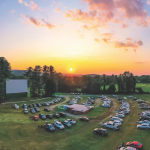When Celine Dion began a five-year performance residency at the Colosseum at Caesars Palace in Las Vegas in 2002, it certainly didn’t seem like a signal that the touring concert business was about to undergo any major changes. Dion’s is a talent perhaps best suited to a home theatre rather than sequential one-night stands. And she certainly seemed to make the right real estate deal: Her 700 shows in the past five years generated more than $500 million, according to the Wall Street Journal, with Elton John pulling in pro rata numbers for his interim Caesars stints when Dion took breaks.
But that remarkable theatre built to accommodate Dion’s show won’t stay empty for long. In February 2008, Bette Midler will begin an extended run, committing to 200 shows. The same trend appears in other venues by other big sellers: Prince did a 21-night run in London in early 2007 (ticket sales benefited from the free distribution of his new record as a cover mount on the Daily Mail newspaper), and Bon Jovi inaugurated the new Prudential Center in Newark, N.J., with a 10-night run in October.
Given the way concerts have become the new revenue generators of the music industry, and given the competitively induced complexity of concert productions, plus the growing cost of putting tours on the road (e.g., oil is approaching $100 per barrel), to reposition a concert as a destination rather than a traveling road show is economically attractive.
Since the music business is changing so radically, it’s worth reexamining what is normally taken for granted. The basic economics are pretty stark. “When you put the show into one place and have your audience come to you,” says Gary Bongiovanni, editor-in-chief of Pollstar magazine, “you’re bringing your overhead costs down to a fraction of what they are on tour. From an artist’s point of view, it’s a very attractive proposition, financially speaking.”
It’s appealing in other ways, too. As much as digital consoles and systems controllers can offer to log and recall information about a particular venue’s acoustical and sonic characteristics, nothing trumps the ability to walk into the same FOH area night after night and know exactly what the reflections are, what the delay values are or how adverse weather one night is going to create a hole in the room that changes sound wave behavior.
When it’s your room, you can control the consistency of the entertainment experience and ensure that the audience, who is paying high three fig-ures for tickets, is going to get its money’s worth. Also, it ensures that the artists know that their music is being presented in the best possible way. In the new music business, it’s all about building brands and building relationships. To do that, you need more than quality — you also need consistency of quality. When you control the environment, you control the experience.
This strategy could impact concert sound in other ways. Music artists and engineers are still fond of vintage signal processing and consoles — plug-ins are simply more affordable and more travel-friendly. But can you imagine the kind of processing and consoles that would be viable if an artist were to be in residence for while? There’s no reason why you couldn’t recreate an accurate recording studio effect when that kind of envi-ronmental control is available. There is, in fact, no reason why the artist’s next recording can’t be done in that same environment.
While the extended-stay concert strategy has thus far been mainly limited to older artists who have the stature to pull sufficient numbers to distant venues, like Barry Manilow’s ongoing run at the Las Vegas Hilton, the strategy could become viable for a larger number of artists, too, especially those catering to niche audiences.
Consumers used to check Ticketmaster or Pollstar to see when (and if) an artist was coming to a nearby venue. Now, when the artist is no longer a moving target, fans can plan their lives — vacations, weekend breaks — accordingly.
But could this trend freeze out a lot of potential listeners, as well? Will everyone be able to make the hajj to his or her own personal musical Mecca? It’s possible that artists will have to occasionally do an old-fashioned tour now and then. Or maybe the creativity of the market will come up with new solutions. Maybe when Linkin Park reaches its own relative seniority, some promoter in the city of Chicago will see the benefit in set-ting up the by-then-creaky band for an extended stay at that landmark: “Come see Linkin Park in Lincoln Park.” Asbury Park might be a little cramped for the Boss, even these days, but who’s to say Atlantic City couldn’t get some of its luster back from Vegas with a long run of Bruce Springsteen?
Celine Dion didn’t invent the extended stay; Branson figured it out years ago, as did Wayne Newton in Las Vegas. But where Branson had an end-of-the-road feeling about it, and Newton was known as much for his kitsch and camp as for his talent, the extended stays of Dion’s successor, and those who will follow ,will continue what has been the makeover show of the century — the new music business.



